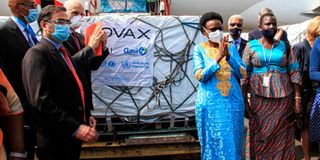Why African Union should counter vaccine imperialism, profiteering

Uganda's Health Minister Jane Ruth Aceng (second right) poses next to boxes of Oxford/AstraZeneca vaccines against the Covid-19 after their delivery as a part of the UN-led Covax initiative, at Entebbe international airport on March 5, 2021. AFP
What you need to know:
- Some companies like AstraZeneca promised not to profit off any Covid-19 vaccines “for the duration of the pandemic”.
- Vaccine developers are reneging on both “benefit-sharing” and priority “post-trial access” promises.
In late February, the African Union, widely held as a model of regional political and economic integration in the world, started distributing the first million doses of the Oxford-AstraZeneca Covid-19 vaccines to about 20 nations.
Faced with constraints to access vaccines, pan-Africanism has suddenly come alive and presented a united front. Today, the continent is counting on this system to secure Africa’s access to life-saving vaccines against the backdrop of growing vaccine imperialism and profiteering.
The AU’s vaccine strategy is inherently multilateral. It entails sourcing the drug for its 55 countries as a collective through the Covax facility — one of three pillars of the Access to Covid-19 Tools (ACT) Accelerator, which was launched by the World Health Organization in April 2020. The AU has also entered into purchasing agreements with major pharmaceutical giants.
The big question is whether regional blocs like the AU and the EU are acting on their own accord or are being used by the interests of vaccine developers.
One view is that the AU vaccine strategy appears to be influenced by powerful global pharmaceutical companies, which helped to create the COVAX Facility in order to circumvent the global bureaucracy and captured the world market for vaccines.
These companies also initiated the multimillion-dollar Advance Purchase Agreements (APAs) with individual states to take over the global market as well as to keep out any possible competition.
Africa confronts the challenge of parochial nationalism, which has prevented vaccine developers from sharing publicly funded vaccine research findings. This is hurting efforts to contain the spread of the Covid-19 epidemic, which has infected at least 109 million people worldwide, causing over 2.4 million deaths as of mid-February.
Vaccine imperialism
A new phenomenon of vaccine imperialism is irreversibly changing the face of imperialism and polarising the world into vaccine haves and vaccine have-nots. Revamping regional integration approaches is necessary to contain surging vaccine imperialism.
Rich countries have more vaccines than they need. For example, the US has enough to vaccinate its population twice over. Canada and Australia have booked enough to protect residents several times over. Collectively, the US, China, the EU and the UK have 78 per cent of more than 131 million doses.
Inversely, Africa’s 55 countries had a total of 0.2 per cent! African Union has ordered 670 million doses, which is less than half of what Africa needs to reach herd immunity.
With global needs now greatly exceeding available supply, the world is in the vortex of a new deadly scramble for vaccines. This pushing up world vaccine prices, which now vary from $6 to $74 per dose. Countries are making onerous direct deals with vaccine suppliers, typically on worse terms than if they had bargained collectively.
According to the African Export-Import Bank (Afreximbank), African countries will pay between $3 (R45) and $10 per vaccine dose to access the shots secured by the AU.
Some companies like AstraZeneca promised not to profit off any Covid-19 vaccines “for the duration of the pandemic”. However, while the AstraZeneca vaccine was ‘trialed’ on the South African population, yet Pretoria is paying 2.4 times more than the EU – US$5.25 compared to US$2.16.
Thus, vaccine developers are reneging on both “benefit-sharing” and priority “post-trial access” promises. They are also turning the idea of ‘ability to pay’ on its head. Uganda is paying 20 per cent more than South Africa to obtain the AstraZeneca vaccine.
Vaccine supplies
If Africa does not work collectively, its sovereignty and rights risks being eroded by vaccine imperialism spearheaded by vaccine developers. Rich countries are accused of blocking access to vaccines. Obviously, vaccines produced generically at greater scale will be far more affordable, enabling a more rapid containment of the virus.
But Britain, USA, EU and other rich countries have opposed the request to enable rapid scaling-up of affordable vaccine supplies. Towards the end of 2020, South Africa and India, backed by a hundred countries, wrote to the WTO in order for it to waive its rigid intellectual property rules so as to allow other countries to produce generic vaccines.
The rich countries objected to the proposal claiming that “there must be incentives in place for innovation and competition.” With all countries in the world not having equal access to vaccines, big pharmaceutical corporations now have unprecedented powers to decide who is going to die or survive.
Blissfully, there is ray of hope that genuine humanism will drive solidarity in responses to Covid-19. New Zealand – which has ordered several times its population’s needs – plans to freely share vaccines with its Pacific island neighbours.
China, which has three vaccines, has promised to make its vaccines available as a “global public good”. For over a year now, Beijing has been providing Covid-19 tests, treatments, personal protective equipment and other pandemic supplies to poor Countries across the world.
The African Union should collectively push for the TRIPS waiver proposal to enable all countries to affordably make or buy ‘generic’ vaccines as the best way forward.
Prof Peter Kagwanja is former Government Adviser and currently Chief Executive at the Africa Policy Institute





